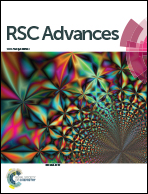Nanofibrous rhPDGF-eluting PLGA–collagen hybrid scaffolds enhance healing of diabetic wounds
Abstract
Patients with chronic, non-healing diabetic ulcers extend hospital stays and increase the financial burden more than non-diabetics. This investigation developed nanofibrous growth factor-eluting poly(lactic-co-glycolic acid) (PLGA)–collagen hybrid scaffolds that enabled the sustainable release of recombinant human platelet-derived growth factor (rhPDGF) to treat diabetic wounds. RhPDGF, collagen, and PLGA were dissolved in hexafluoroisopropanol, and then electrospun into nanofibrous scaffolds. An enzyme-linked immunosorbent assay kit and an elution method were utilized to evaluate the rates of in vivo and in vitro release of growth factors from the scaffolds. High concentrations and effectiveness of rhPDGF were documented for over three weeks. The water contact angles of nanofibrous rhPDGF-eluting PLGA–collagen hybrid scaffolds were less (97.2 ± 0.7°) than those of PLGA–collagen hybrid mesh (107.6 ± 1.0°) or virgin PLGA (113 ± 3.3°) (all post hoc p < 0.05). The nanofibers with rhPDGF-eluting PLGA–collagen hybrid scaffold also exhibited significantly higher water-retaining capacity than those in other groups (all post hoc p < 0.001). Furthermore, the scaffolds caused more re-epithelialization and contained more collagen I in rats with rhPDGF-eluting scaffolds than controls, as determined from the expressed matrix metalloproteinase 9 in the hair canals in developing hair follicles. These results revealed for the first time, the application of rhPDGF as a growth factor adjuvant, and developed a new collagen-based composite with potent cell infiltration and epithelialization properties.


 Please wait while we load your content...
Please wait while we load your content...